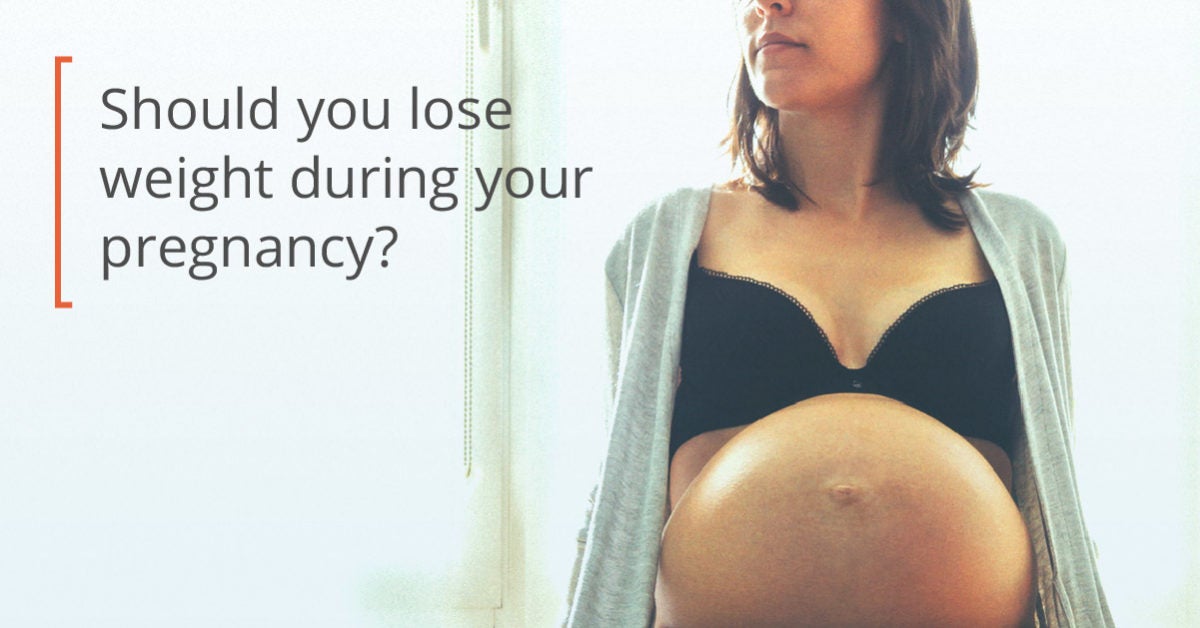
Diet & Exercise to Lose Weight During Pregnancy
In an ideal world, you need to be at your proper weight before you get pregnant. But, for some women, it becomes difficult to maintain a healthy weight. It is worth noting that healthcare experts do not suggest any woman lose weight when they are pregnant. Instead, they motivate them to follow simple exercises and a proper diet.
So, if you are a woman having a BMI of beyond 30, then losing a significant amount of weight during pregnancy can be beneficial for you. It not only promotes overall well-being but also helps you stay more energetic and less tired. In addition to that, you can prepare your body to bear the pain of labor during childbirth. However, this article will shed light on the necessary information that you need to know before you indulge in lose weight during pregnancy.
Why Losing Weight during Pregnant Is Not Recommended
Pregnancy is when your body needs to be nourished and healthy to provide all the nutrients your baby will need. It’s important to understand that losing weight during pregnancy comes with risks. Not only could it endanger your health, but also your baby’s health.
If you’re overweight, losing weight soon after conception can be beneficial because it will give you more energy for daily activities and reduce the risk of complications during labor and delivery. However, if you’re already at a healthy weight before becoming pregnant (as recommended by the American College of Obstetricians and Gynecologists), there’s no reason to lose weight during this time to ensure better results for yourself or your baby.
Is it safe to lose weight during pregnancy?
The answer to this question varies depending on the weight you’ve gained in pregnancy and your pre-pregnancy weight.
- If you’re obese or overweight, losing weight during pregnancy can increase the risk of complications for both you and your baby.
- If you’re of normal weight (body mass index between 18.5 and 25), it’s safe to lose up to 2 pounds per month during pregnancy. That can help prevent excessive weight gain while still giving your baby enough nutrients.
- If you’re underweight (BMI less than 18.5), losing too much weight during pregnancy can be harmful to both mother and baby, so try not to lose more than 1 pound per week.
Will it be safe for the baby if I lose weight?
No, you should not be trying to lose excess weight during pregnancy. There are so many reasons why it’s a bad idea. First, the baby needs all the nutrients and calories to grow and develop properly. If you start cutting down on food or skipping meals, this can cause your baby to become malnourished and unhealthy as well.
As well as causing health problems for the baby, losing weight can also affect their development in other ways, such as making sure they have enough room for their growing body (which is why you need to eat a healthy diet). The best thing you can do during this stage is practice good nutrition habits so that you and your child will stay healthy!
Can I diet to lose weight during pregnancy?

Considering dieting to lose weight during pregnancy, it’s essential to consider the potential risks. While there is no clear evidence that dieting during pregnancy causes harm to the fetus or newborn, it may cause problems such as low birth weight and premature delivery.
Losing weight too quickly can increase these risks because your body will burn fat instead of storing it when food intake is low. This means that if you restrict your calorie intake when pregnant, many calories will be held in your body instead of being used for growth and development of the fetus (which includes fetal organ development).
In addition to the physical complications associated with excessive weight loss while pregnant (such as hypoglycemia), diets can also affect psychological health by causing depression and anxiety from feeling deprived or unsatisfied with one’s body image.
Optimal Weight Gain Recommendations during Pregnancy
The recommended weight gain during pregnancy depends on your pre-pregnancy body mass index (BMI). You should gain between 25 and 35 pounds if you had an average BMI before getting pregnant and 15 to 25 pounds if your BMI was high. It’s important to talk with your doctor about how much weight is appropriate for you, as it can vary based on other factors like age and height.
Moreover, weight gain during pregnancy is a controversial topic. There are many factors that affect how much weight you should gain during pregnancy, such as your pre-pregnancy weight, your ethnicity and whether or not you’re carrying multiples. But most experts agree that women with a normal BMI (18.5 to 24) should aim for 25 to 35 pounds during their entire pregnancy.
Risks of Being Overweight During Pregnancy
If you’re overweight or obese during pregnancy, you have an increased risk of developing gestational diabetes. Gestational diabetes is a high blood sugar produced in pregnant women who have never had diabetes before.
It can lead to severe complications for both mother and baby, including preeclampsia (high blood pressure) and cesarean section delivery. Infants born to mothers with gestational diabetes are also at risk for congenital disabilities such as neural tube defects like spina bifida.
Mothers with this condition may also be more likely to develop postpartum depression after delivery due to the stress associated with having a child with special needs due to preterm birth or other complications from gestational diabetes.

How can I safely lose weight during pregnancy?
Losing weight during pregnancy can be tough. But as your baby grows and grows, you’ll want to shed the extra pounds before they weigh you down—literally. When you’re pregnant, you may be tempted to try to lose weight as quickly as possible. It’s understandable—you want to look good for that baby bump, and you might feel like the extra pounds are holding you back from being able to move around as much as you’d like.
The best way to lose weight during pregnancy is to eat fewer calories than you burn. You may be tempted to resort to fad diets and other quick fixes, but they don’t work in the long term. And they can be dangerous for you and your baby.
You can lose weight safely by eating a healthy diet, exercising regularly, and tracking your progress.
- Eat a balanced diet: Make sure you’re getting enough calories and nutrients while pregnant. You may need to eat more than usual to stay healthy and keep up your energy level.
- Exercise moderately: Exercise can help you lose weight and keep your body strong during pregnancy. Talk with your doctor before starting an exercise program, especially if you haven’t exercised before or have an underlying health condition that affects your ability to exercise. Exercise safely by doing milder forms of exercise.
The thing is, though: Losing weight too quickly during pregnancy can be dangerous. If you’re trying to get rid of more than two pounds per week, your doctor will probably tell you not to do it. That’s because rapid weight loss can increase your risk of complications like preterm labor and preeclampsia (a condition that causes high blood pressure).
Plus, if your body isn’t getting enough nutrients and calories to support itself and its baby, then your baby may be at risk too.
So what should you do instead? First, ensure that whatever diet a pregnant woman plans won’t put either of you at risk of nutritional deficiencies or dehydration—and it includes plenty of fruits and vegetables! Then take it slow: don’t expect drastic results in just a few weeks—it’ll probably take several months for most people.
What are the Warning signs that show you should lose weight during pregnancy?
The following are the warning signs that show you should lose weight during pregnancy:
1. You are pregnant with twins
If you are expecting twins, it is essential to monitor your weight gain carefully. Obesity can lead to complications during pregnancy, including gestational diabetes and preeclampsia.
Additionally, obesity can increase the risk of premature delivery, which can cause serious health problems for both mother and child.
The American College of Obstetricians and Gynecologists recommends that women who are at a healthy weight before pregnancy should gain 25-35 pounds during their first trimester of twin pregnancy; overweight women should gain 28-40 pounds; obese women should gain 15-25 pounds.
Your weight gain is below the recommended guideline
You should gain between 25 and 35 pounds during your pregnancy. Gaining too little weight can affect your baby’s health, but gaining too much may also be harmful to your child.
If you are gaining more than the recommended weight, talk to your doctor about how to best manage this issue. If you’re not gaining enough weight, speak with a healthcare provider so they can help determine what might be causing this problem and how it can be resolved.
2. Gestational diabetic
Gestational diabetes is a type of diabetes that only occurs during pregnancy. The good news is that it usually goes away after delivery. However, women with gestational diabetes are at risk of complications for themselves and their babies. You can help prevent these problems by managing your blood sugar levels through diet for pregnant women, exercise, and medication.
If you were diagnosed with gestational diabetes early in your pregnancy (at 20 weeks or earlier), ask your doctor about how to manage the condition throughout the rest of your pregnancy and beyond.
3. You have preeclampsia
Preeclampsia is a dangerous condition that can endanger your health and your baby’s health. It’s caused by high blood pressure and occurs in the second half of pregnancy. You should speak with your doctor if you have high blood pressure or swelling in your hands, face, or feet. Preeclampsia can cause high blood pressure that leads to seizures if not treated.
4. The risk of developing high blood pressure during pregnancy
One of the most severe risks of being overweight during pregnancy is developing high blood pressure. This can lead to preeclampsia. Preeclampsia is a severe condition that needs to be treated and can cause complications for both the mother and baby.
Preeclampsia develops in about 2% of pregnancies, and it’s more common among women who are overweight or obese during pregnancy. Blood pressure rises rapidly after 20 weeks gestation, along with protein in the urine and swelling (edema) in your hands or feet. If you have these symptoms or they continue after delivery without any explanation, you might have developed preeclampsia before delivery (called chronic hypertension).
Best Exercise for pregnant women to lose weight
1. Swimming
Swimming is an excellent exercise for pregnant women. It’s gentle on your joints and muscles, which makes it one of the best exercises to avoid pregnancy aches and pains. Swimming is also good for the heart and lungs, helping you and your baby by strengthening your cardiovascular system. Swimming also helps to improve posture.

2. Walking
Walking is a great way to keep fit during pregnancy. It’s also an excellent form of exercise for pregnant women and helps to burn calories, which can help you get pregnant. Walking is safe during any trimester of your pregnancy as long as you do it at a pace that feels comfortable for you.
If you have questions about your health or your baby’s health, make sure to talk with your doctor or midwife before starting any new Exercise for pregnant women program.
3. Cardio
Cardio workouts are a great way to burn calories. Cardio can be done at home, in the gym, or outdoors. It’s essential to have your doctor’s approval before starting any Exercise for pregnant women program.
Cardio is also good for your heart and will help with weight loss during pregnancy if you exercise correctly. The recommended amount of cardio is 30 minutes daily, but higher-intensity workouts can give you better results in less time. Some examples of cardio include walking, running, biking and swimming.
4. Cycling
Cycling is one of the best exercises for pregnant women. The good thing about cycling is that it’s low-impact, so you can do it even when pregnant. Cycling also helps increase your heart rate and burn calories. It’s a great way to be active without causing stress on your body, especially since you’re carrying extra weight during pregnancy.
Cycling can be done indoors or outdoors, so there are no excuses! If you have access to a stationary bike at home or work, use it regularly throughout your pregnancy (and beyond). If not, find an outdoor area where no cars pass by often and ride safely while enjoying the fresh air!
5. Aerobics
Aerobic Exercise is a great way to lose weight, but more effective options exist. That’s because aerobic exercises don’t necessarily burn fat directly—instead, they work on your overall body composition by burning calories and increasing lean muscle mass. By doing aerobics regularly and changing up your routine, you can see a significant difference in your weight loss efforts.

6. Yoga
Yoga is a great way to stay fit during pregnancy if you’re willing to do it. Yoga helps you relax, reduce stress and improve sleep quality. It can also help with back pain, insomnia, and constipation (you know what happens when babies are in your body).
It’s not just for women who want to lose weight while pregnant — online yoga classes are also suitable for people looking to stay fit for nine months!
7. Stretching
Stretching is a form of exercise and an excellent way to warm up before exercising. It also helps improve flexibility, which can reduce pain and stiffness. Stretching after exercise can help you cool down more quickly.
Some women like to stretch their muscles several times throughout the day; others prefer stretching at night when they are more relaxed. Stretch your body by standing with one leg extended in front of you as far as it will go. Hold this position for about 15 seconds, then repeat with the other leg extended in front of you as far as possible.
Best Diet for pregnant women to lose weight

1. Avoid junk food
While you are pregnant, you have to avoid junk food. Junk food is high in calories, but it has no nutrients. It can also cause weight gain and unhealthy eating habits that may be hard to break after the baby is born.
Avoid processed foods and any foods with trans fats and saturated fats because they are known to cause health problems such as heart disease and diabetes. You should also reduce salt and sodium while pregnant because they can lead to high blood pressure, which could harm your baby if it isn’t controlled.
2. End your meals with a fruit
It’s also a good idea to end your meals with fruit. Fruit is an excellent source of fiber and vitamins, so it will help you feel full after eating. Plus, fruits are low in calories but high in nutrients, making them an ideal dessert substitute for those who want to lose weight.
Add calcium-rich foods to your diet
You may also want to add calcium-rich foods to your diet for pregnant women. Calcium is essential for pregnant women because it helps develop the baby’s bones and teeth.
The recommended daily allowance (RDA) for calcium during pregnancy is 1000 mg daily, which can be obtained by eating three servings of dairy products or drinking two glasses of milk daily. If you don’t like milk, try other sources such as yogurt, cheese, or fortified orange juice with added calcium.
3. Drink lots of water
Drinking lots of water is crucial to your health during pregnancy, but it can also help you lose weight. Water helps keep your body hydrated and helps flush out waste products. Drinking enough water also keeps you feeling full, so you’ll be less tempted to overeat or eat unhealthy foods high in calories.
Drinking enough water is vital for reducing cravings because it gives your body the nutrients it needs to stay strong and energized throughout the day. This can help prevent binge eating later on in the day, which would lead to weight gain if not addressed with a healthier diet for pregnant women like this one!
4. Eat more lean proteins and whole grains
Lean protein sources include fish, chicken, turkey, and tofu. Whole grains include brown rice, wheat bread, pasta, and oatmeal. Try to eat lean proteins with every meal and replace refined carbohydrates like white bread or white rice with whole-grain alternatives whenever possible.
Tips to lose weight during pregnancy
1. Get Help
When it comes to weight loss, you might feel like you’re on an island of one. But many people can help. A nutritionist or gym trainer can explain what foods are best for you and your baby and help you start a safe workout routine during pregnancy. They’ll also be able to work with your doctor to make sure you’re healthy enough to exercise safely.
2. Focus on Healthy Eating
If you’re going to lose weight during pregnancy, the best way to do it is by eating the right amount of calories. Consuming a balanced diet is vital for both you and your baby. Eating more fruits and vegetables can help with this goal and reduce the intake of processed foods.
It’s also important not to overeat salt or sugar, fat or protein because these things can harm your health in multiple ways, including increasing blood pressure. Don’t overeat fiber either because that can upset your digestive system: when constipation sets in during pregnancy, it might lead directly to miscarriage!
3. Stay Hydrated and Eat Regularly
To ensure you stay hydrated, drink plenty of water. You should also drink juice and milk, which are good sources of calcium and protein. Avoid sugary drinks like soft drinks and fruit juices because they can contribute to weight gain during pregnancy.
Eating regularly and taking in good calories for your body’s needs during pregnancy is essential. Eating small meals every 2-3 hours will help prevent hunger pangs or low blood sugar levels that can occur when you skip meals or eat infrequently. Make sure you’re eating the right kinds of food; avoid fried foods, fatty meats, and foods high in sodium (salt).
4. Exercise
It’s important to exercise during pregnancy, but you should be careful not to overdo it. Too much Exercise can cause problems with your blood pressure and may increase the risk of miscarriage.
However, some exercises are better for pregnant women than others.
For example, swimming is a great low-impact activity that keeps you fit throughout pregnancy. You can also try walking or running on a treadmill at an incline if you want an extra challenge. If these options aren’t for you, take advantage of other opportunities, such as working out at home or joining a prenatal fitness class with other moms-to-be in your area!
5. Watch Out for Cravings
Pregnancy cravings are common and challenging to manage, especially if you’ve been trying to lose weight. But it’s important to remember that these cravings are a normal part of pregnancy and shouldn’t be cause for concern unless accompanied by nausea or other symptoms.
If you feel that your cravings are more extreme than what’s considered normal, talk with your doctor about whether there may be an underlying medical condition causing them.

Wrapping Up
You should consult your doctor before starting any exercise routine. It’s essential to be aware of the warning signs of pregnancy, and you should always consult with a professional before starting any new diet for pregnant women or exercise programs. So, what is keeping you waiting? Get in touch with the professional, expert, and experienced trainers of The Musclez Gym to know which exercises you should start doing which can help you lose weight safely.
